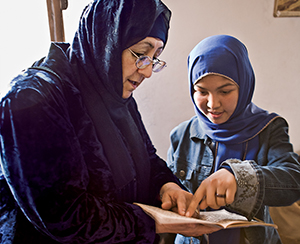Through our business and in partnership with others, Abbott is working every day to empower women to build better lives and stronger communities in countries around the world.
One example of this work is a partnership to support the pioneering efforts of Nobel Prize nominee Sakena Yacoobi to improve health and provide livelihoods for women in Afghanistan. For more than a decade, Abbott and the Abbott Fund have worked with Yacoobi’s Afghan Institute of Learning (AIL) and Direct Relief to empower women as healthcare providers. The partnership has trained more than 75 midwives and supported women-staffed clinics, providing critical care and health education for more than 1.5 million women and children, and much-needed economic opportunity for women.Through our business and in partnership with others, Abbott is working every day to empower women to build better lives and stronger communities in countries around the world.
This important work was highlighted in a cover story in the Stanford Social Innovation Review, "Empowering Women at the Grassroots," including a comment from Abbott's Katherine Pickus on the impact of the partnership: "What we found within a year of their completion of training is that each and every midwife had a job and was making money for her family, investing that money in their girls' education, and really developing a cycle of empowerment."

Advancing Women in the Workplace
Of course, our work to empower women starts in our own workplace, where we depend on the vital leadership, insights and expertise of women across our company, at every level. Recently, Abbott was recognized as one of the top companies for advancing women leaders by the National Association of Female Executives – read more about this honor in Business Insider.
“Globally, women are the gatekeepers to healthcare, so it makes sense for our executive ranks to closely reflect the markets that we serve," said Stephen R. Fussell, executive vice president, Human Resources at Abbott. "At Abbott, women make up 46 percent of management, nearly half of our global workforce, and hold 44 percent of our profit and loss roles.”
Investing in Women to Strengthen Our Business
Beyond our own employees, investing in the advancement of women also can deliver a competitive advantage to our business. One example: in India, we’re starting a new initiative to provide targeted support to women dairy farmers to strengthen our supply chain.
In many households, women conduct the vast majority of dairy activity but have little decision-making power, and little training on farming techniques and business literacy. We’re aiming to help address these gaps, sharing expertise in business management, animal care and other skills, with the goal of delivering an immediate return in better income, competitiveness and strengthened position in society for women. Longer term, this also will help them deliver high-quality milk for our new nutrition production plant in India to meet the needs of local consumers.
Advancing Health, Education and Opportunity
Abbott and the Abbott Fund also work in partnership with leading nonprofit organizations to improve women's health and expand opportunity for women through educational and economic development initiatives. A few examples:
For more examples of how Abbott is unlocking the power of health to build a healthier, thriving society, please visit our global citizenship website: www.abbott.com/responsiblity.
Please be aware that the website you have requested is intended for the residents of a particular country or region, as noted on that site. As a result, the site may contain information on pharmaceuticals, medical devices and other products or uses of those products that are not approved in other countries or regions.
The website you have requested also may not be optimized for your specific screen size.
Share